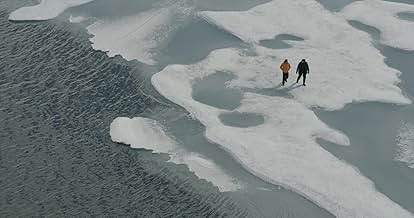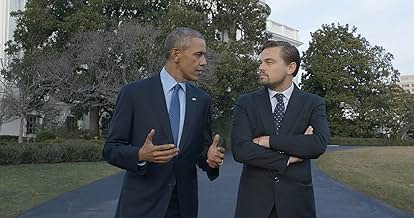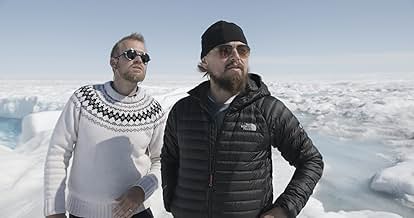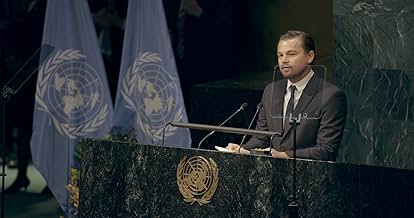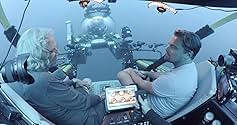AVALIAÇÃO DA IMDb
8,2/10
29 mil
SUA AVALIAÇÃO
Um olhar sobre como as mudanças climáticas afetam nosso meio ambiente e o que a sociedade pode fazer para prevenir o declínio de espécies ameaçadas, ecossistemas e comunidades nativas em tod... Ler tudoUm olhar sobre como as mudanças climáticas afetam nosso meio ambiente e o que a sociedade pode fazer para prevenir o declínio de espécies ameaçadas, ecossistemas e comunidades nativas em todo o planeta.Um olhar sobre como as mudanças climáticas afetam nosso meio ambiente e o que a sociedade pode fazer para prevenir o declínio de espécies ameaçadas, ecossistemas e comunidades nativas em todo o planeta.
- Prêmios
- 2 vitórias e 8 indicações no total
Ban Ki-moon
- Self
- (as Ban Ki-Moon)
Mike Brune
- Self
- (as Michael Brune)
Enric Sala
- Self
- (as Dr. Enric Sala)
Michael E. Mann
- Self
- (as Dr. Michael E. Mann)
Tommy Remengesau
- Self
- (as H.E. Tommy E. Remengesau Jr.)
Avaliações em destaque
Forget egos, forget who's who. That's not what this is about.
The message of this documentary film is to save our planet. Each country, each continent. Our home.
You are taken on a worldwide tour of diverse ecological systems. You are shown how people are already struggling due to the destruction and greed of man. You will see how our consumerism contributes to this disaster in the waiting.
Watch the evidence and see the consequences of global warming for yourself. This is powerful and sobering viewing. It has made me realize how I personally can take positive action to help prevent the destruction of our planet.
Collectively, we can make a difference. Wherever you live in the world, you can decide to have a role to play. Our elected leaders will act if enough of the people they govern make this issue a top priority.
Give one hour and a half of your time, then make your own mind up.
The message of this documentary film is to save our planet. Each country, each continent. Our home.
You are taken on a worldwide tour of diverse ecological systems. You are shown how people are already struggling due to the destruction and greed of man. You will see how our consumerism contributes to this disaster in the waiting.
Watch the evidence and see the consequences of global warming for yourself. This is powerful and sobering viewing. It has made me realize how I personally can take positive action to help prevent the destruction of our planet.
Collectively, we can make a difference. Wherever you live in the world, you can decide to have a role to play. Our elected leaders will act if enough of the people they govern make this issue a top priority.
Give one hour and a half of your time, then make your own mind up.
I am glad that this documentary was made, even though I felt it was talking to someone other than me. The movie is focused on America (even though what it preaches is relevant all over the world), and much of the information is not really ground breaking if you are already concerned about the environment. I am not complaining about this, as that is probably the best target audience to try to reach for a documentary like this. There's no reason to make more documentaries preaching to the choir.
The documentary itself is mostly well made. Leonardo travels from one place to the other, and talks with some big names. Some of it feels kind of irrelevant, and the best parts is when Leonardo talks with people who are not that famous, especially the one subject that shows her frustration. Some of the places he travels are interesting to see, though it's mostly quick visits, and at times they feel more like backdrops than important set pieces. Despite the documentary jumping from one theme to the next, it holds together quite well, and Leonardo's journey functions well as a mean to take the viewer through all the information.
Personally I would have liked a documentary that was a bit more science heavy, maybe like a combination of the nature trips that Leonardo goes on here, and the presentation from Al Gore's film. But I can understand why they went in the direction they went here, and I hope it resonates with a lot of people that have not thought much about this.
The documentary itself is mostly well made. Leonardo travels from one place to the other, and talks with some big names. Some of it feels kind of irrelevant, and the best parts is when Leonardo talks with people who are not that famous, especially the one subject that shows her frustration. Some of the places he travels are interesting to see, though it's mostly quick visits, and at times they feel more like backdrops than important set pieces. Despite the documentary jumping from one theme to the next, it holds together quite well, and Leonardo's journey functions well as a mean to take the viewer through all the information.
Personally I would have liked a documentary that was a bit more science heavy, maybe like a combination of the nature trips that Leonardo goes on here, and the presentation from Al Gore's film. But I can understand why they went in the direction they went here, and I hope it resonates with a lot of people that have not thought much about this.
This is an excellent documentary for masses that are either not that familiar with the realities of climate change or don't understand what is at stake or how it works and why.
This was probably the goal of the producers (among them Leonardo Di Caprio or Michael Scorsese) to appeal to a general audience. I must admit I watched it also for that reason. And I see no problem with that! I spare my comment on Leo Di Caprio's activism and work in that field for later as I know many argue that his activism is only his PR and so on...
But, I think the point here is the message of this movie, not the messenger. Visually it is excellent. Leo Di Caprio and all the crew takes us on all the places directly affected by the climate change and show us how the poorest countries on Earth suffer the most of the effects of climate change. They interview not only politicians, leaders and, the pope - but mostly scientists and local people from the most damaged areas. They connect how the oil industry and current energy giants like Exxon, Tepco and so on. lobby in US congress to buy their support and tacit consent, but not dwell too much on it - as if to shift the focus to nature with its stunning cinematography and rather appeal to people on that level, while showing how climate change already f*cked up Poles, forests, and coastal areas and how it's gonna f*ck up a many more areas and shape the politics and economy of the near future.
I also liked that despite his celebrity status Leo Di Caprio (the main interviewer) doesn't fall into false hopes and promises but keeps his mind open and skeptic. Because I think the goal of the movie is to show the reality of the long-term effect and not to wallow too much in short-term steps - like Paris 2015 conference.
Lastly, about Leo Di Caprio. You don't need to like him to enjoy this movie. And you can say whatever you want about his activism, the fact is that on the top of making this documentary, he drives an electric car, and a bike, uses his Facebook almost solely on promoting climate change actions and even spent his time during acceptance of his Oscar for The Revenant to speak about native Americans and climate change. So I don't think this is all just a stunt and PR! Who said that just because you are famous and rich you can't genuinely care and express your activism or can't worry about the planet and the civilization? I think this type of thinking is just another side of the same coin, people who criticize "celebrities" for not speaking out, and people who criticize "celebrities" once they do speak up, are in my opinion much more influenced by the celebrity culture than they think or can admit. It's no win situation when you put people in a mental box.
All in all,you can find some great piece of activism and cinematography in the documentary and I highly recommend for anyone who is ...a human being.
And if you are interested in deeper insights into how this climate change crisis intertwines with politics, corruption, war and economy, go and watch The Shock Doctrine, or have a look on the Zeigeist movie trilogy and The Zeitgeist movement.
This was probably the goal of the producers (among them Leonardo Di Caprio or Michael Scorsese) to appeal to a general audience. I must admit I watched it also for that reason. And I see no problem with that! I spare my comment on Leo Di Caprio's activism and work in that field for later as I know many argue that his activism is only his PR and so on...
But, I think the point here is the message of this movie, not the messenger. Visually it is excellent. Leo Di Caprio and all the crew takes us on all the places directly affected by the climate change and show us how the poorest countries on Earth suffer the most of the effects of climate change. They interview not only politicians, leaders and, the pope - but mostly scientists and local people from the most damaged areas. They connect how the oil industry and current energy giants like Exxon, Tepco and so on. lobby in US congress to buy their support and tacit consent, but not dwell too much on it - as if to shift the focus to nature with its stunning cinematography and rather appeal to people on that level, while showing how climate change already f*cked up Poles, forests, and coastal areas and how it's gonna f*ck up a many more areas and shape the politics and economy of the near future.
I also liked that despite his celebrity status Leo Di Caprio (the main interviewer) doesn't fall into false hopes and promises but keeps his mind open and skeptic. Because I think the goal of the movie is to show the reality of the long-term effect and not to wallow too much in short-term steps - like Paris 2015 conference.
Lastly, about Leo Di Caprio. You don't need to like him to enjoy this movie. And you can say whatever you want about his activism, the fact is that on the top of making this documentary, he drives an electric car, and a bike, uses his Facebook almost solely on promoting climate change actions and even spent his time during acceptance of his Oscar for The Revenant to speak about native Americans and climate change. So I don't think this is all just a stunt and PR! Who said that just because you are famous and rich you can't genuinely care and express your activism or can't worry about the planet and the civilization? I think this type of thinking is just another side of the same coin, people who criticize "celebrities" for not speaking out, and people who criticize "celebrities" once they do speak up, are in my opinion much more influenced by the celebrity culture than they think or can admit. It's no win situation when you put people in a mental box.
All in all,you can find some great piece of activism and cinematography in the documentary and I highly recommend for anyone who is ...a human being.
And if you are interested in deeper insights into how this climate change crisis intertwines with politics, corruption, war and economy, go and watch The Shock Doctrine, or have a look on the Zeigeist movie trilogy and The Zeitgeist movement.
Greetings again from the darkness. Ten years ago Al Gore became a climate-change icon thanks to the Oscar-winning documentary An Convenient Truth (from director Davis Guggenheim). With this updated warning, the climate change crown is passed to Leonardo DiCaprio, and rather than just speak to the topic, he takes us on a worldwide journey to show us the effects.
The film is bookended by DiCaprio's speech to the UN general assembly after he was named UN Messenger of Peace on Climate Change. It's a reminder that the mega movie star has long been an environmental activist and yes, before you scoff, he does acknowledge that his carbon footprint is probably larger than ours (an obvious understatement – unless you also travel by yacht and private jets, and own multiple mansions).
DiCaprio's personal story about Bosch's "The Garden of Earthly Delights" hanging above his crib (seriously, how many parents think this is acceptable artwork for a toddler?) acts as a visual to his message that we are on the path of virtual destruction to the earth that we now know.
The power of celebrity in on full display as DiCaprio scores interviews with such luminaries as UN Secretary General Ban Ki-moon, President Obama, Elon Musk, John Kerry, and even Pope Francis. There is also a clip of his long-ago interview with then President Clinton (Bill, not Hillary). However, it's not the talking heads that have the most impact here. Rather, it's the first-hand look at the Canadian Arctic, the disappearing glaciers of Greenland, the sunny day street flooding in Miami, the destruction of Indonesian Rain Forest to capitalize on the palm oil market, and the eroding coral reefs. The film plays like a Tim Burton Travel Channel series each stop more nightmarish than the previous.
His passion is obvious, though his knowledge less so. DiCaprio understands the power his celebrity brings, and he joins with director Fisher Stevens (known mostly for his acting, but also an Oscar winning director for The Cove, 2009) in this attempt to bring the urgent message to the masses. As they state, we are beyond simply changing lightbulbs, and the key is a shift from fossil fuels to renewable energy a shift that China (not the U.S.) has taken seriously.
With generic solutions like "consume less" and "vote better", the film mostly avoids controversy though it does acknowledge the slick and well-funded 'campaign of denial' by those who profit mightily from a fossil-fuel dependent world. We see an impressive map/video screen tracking ocean currents, temperatures, etc. and there is a chart comparing electricity usage by U.S. citizens vs other countries (we are energy hogs, in case you weren't sure). The ending message hasn't changed much in the past 10 years "It is all up to us".
The film is bookended by DiCaprio's speech to the UN general assembly after he was named UN Messenger of Peace on Climate Change. It's a reminder that the mega movie star has long been an environmental activist and yes, before you scoff, he does acknowledge that his carbon footprint is probably larger than ours (an obvious understatement – unless you also travel by yacht and private jets, and own multiple mansions).
DiCaprio's personal story about Bosch's "The Garden of Earthly Delights" hanging above his crib (seriously, how many parents think this is acceptable artwork for a toddler?) acts as a visual to his message that we are on the path of virtual destruction to the earth that we now know.
The power of celebrity in on full display as DiCaprio scores interviews with such luminaries as UN Secretary General Ban Ki-moon, President Obama, Elon Musk, John Kerry, and even Pope Francis. There is also a clip of his long-ago interview with then President Clinton (Bill, not Hillary). However, it's not the talking heads that have the most impact here. Rather, it's the first-hand look at the Canadian Arctic, the disappearing glaciers of Greenland, the sunny day street flooding in Miami, the destruction of Indonesian Rain Forest to capitalize on the palm oil market, and the eroding coral reefs. The film plays like a Tim Burton Travel Channel series each stop more nightmarish than the previous.
His passion is obvious, though his knowledge less so. DiCaprio understands the power his celebrity brings, and he joins with director Fisher Stevens (known mostly for his acting, but also an Oscar winning director for The Cove, 2009) in this attempt to bring the urgent message to the masses. As they state, we are beyond simply changing lightbulbs, and the key is a shift from fossil fuels to renewable energy a shift that China (not the U.S.) has taken seriously.
With generic solutions like "consume less" and "vote better", the film mostly avoids controversy though it does acknowledge the slick and well-funded 'campaign of denial' by those who profit mightily from a fossil-fuel dependent world. We see an impressive map/video screen tracking ocean currents, temperatures, etc. and there is a chart comparing electricity usage by U.S. citizens vs other countries (we are energy hogs, in case you weren't sure). The ending message hasn't changed much in the past 10 years "It is all up to us".
Being the objective of this documentary to raise awareness and support DiCaprio's activity as a "UN messenger of peace" and environmental activist, I believe it really achieved its goal as it is truly a breathtaking, eye-opening film which urges the viewer to strive for a change.
Throughout the documentary we are presented with shocking information, images and educated people's opinion on the matter (like world leaders and scientists) which adds credibility to it. Leonardo DiCaprio and his team do not spare criticism on some of the biggest countries (like the US) policies and on the fossil fuel industry.
Leo's charisma and ability to persuade and entertain the public allied to his drive as an environmental activist just leaves you glued to your seat thinking what can you do to make a change. I believe this really is the kind of information that should be more out there and DiCaprio's celebrity-status, as well as all the other people interviewed, is great for visibility.
If anything, I just wish this was a mini-series to know even more about this issue the world is facing, which might just be the biggest one it ever did...
Throughout the documentary we are presented with shocking information, images and educated people's opinion on the matter (like world leaders and scientists) which adds credibility to it. Leonardo DiCaprio and his team do not spare criticism on some of the biggest countries (like the US) policies and on the fossil fuel industry.
Leo's charisma and ability to persuade and entertain the public allied to his drive as an environmental activist just leaves you glued to your seat thinking what can you do to make a change. I believe this really is the kind of information that should be more out there and DiCaprio's celebrity-status, as well as all the other people interviewed, is great for visibility.
If anything, I just wish this was a mini-series to know even more about this issue the world is facing, which might just be the biggest one it ever did...
Você sabia?
- CuriosidadesReleased for free on the National Geographic YouTube channel.
- Citações
Leonardo DiCaprio: You are the last best hope of Earth. We ask you to protect it or we, and all living things we cherish, are history.
- ConexõesFeatured in Docventures: Ilmastonmuutos (2017)
- Trilhas sonorasBefore the Flood
Composed by Trent Reznor & Atticus Ross, with Gustavo Santaolalla
Principais escolhas
Faça login para avaliar e ver a lista de recomendações personalizadas
- How long is Before the Flood?Fornecido pela Alexa
Detalhes
- Data de lançamento
- País de origem
- Idioma
- Também conhecido como
- Before the Flood
- Locações de filme
- Ushuaia, Tierra del Fuego, Argentina(Filmed in)
- Empresas de produção
- Consulte mais créditos da empresa na IMDbPro
Bilheteria
- Faturamento bruto mundial
- US$ 988
- Tempo de duração
- 1 h 36 min(96 min)
- Cor
Contribua para esta página
Sugerir uma alteração ou adicionar conteúdo ausente


